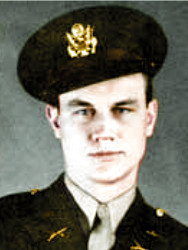
Clapper: Guadalcanal
By Raymond Clapper
Raymond Clapper, before setting out with a naval striking force which took him to his death, wirelessed a few columns in advance. Last Jan. 1, upon leaving the country for the Pacific, he had written that “some people in Washington feel there is no sufficient awareness at home of how much our men are doing and in what a living hell they must sometimes do it.” His mission was to help increase that awareness. Hence we feel that he would want us to print, posthumously, these columns written some days ago.
Guadalcanal, Solomon Islands – (by wireless)
In the evening after dinner, I sat on a wet front porch with Maj. Gen. Maxwell Murray, commander of the South Pacific forward area, right on the spot where the first Marines landed on Guadalcanal.
No longer is there any war here, for this is far to the rear. Guadalcanal is just a big supply dump. Yet it is not quite as peaceful and serene as most battlefields become when the war moves on and nature smiles again. This was a stormy night, and the wind lashed the surf up onto the little plot in front of Gen. Murray’s quarters. The rain blew in through the screened sides of his native thatched hut.
I wondered how the Marines ever landed here, but that was in August, in the dry season. Now it has rained every day since Christmas, as the first sailor I walked with said. I have found it depressing even in the short time I have been on the island.
Pacific War shrine
Guadalcanal has become a kind of shrine for the Pacific War in the minds of the American people as it was here we won the long jungle struggle with the Japs that stopped their advance and marked the beginning of our slow march toward Tokyo.
Nobody will ever live happily on this place. It is not unpleasant to the eye along the coast. Some spots in our military developments, which stretch for 30 or more miles along the north coast, are as neat and attractive as an outdoor summer colony, with little huts under neatly cleared coconut groves, and little white coral walks edged with stones or small tree trunks. But it is wet. The rain, or what a Californian might call the Guadalcanal mist, drips as it did on the stage for Somerset Maugham’s play, Rain.
The high surf broke two barges loose and they washed up on our beach. The tents were never dry. Everything becomes as wet as the outside of a beer bottle on a warm day.
RAdm. Theodore Wilkinson and I talked for a couple of hours in his office tent with the rain washing in onto the floor. But there is no use bothering about wet floors, nor about the mud that is carried in large cakes on everybody’s shoes.
Your foxhole will be complete full of water unless you cover it with canvas – in which case it will be only half full – although that is not so important here as at Munda, where two nights before I was there 20 men were injured because they stayed in bed instead of diving for their wet foxholes.
Mosquitoes dangerous foe
And when friendly little lizards run up your screen wire walls, you pay no attention. It’s the mosquitoes you must watch out for.
A heroic anti-malaria fight has worked wonders since the days when a high percentage of our men got the disease – and one admiral got it from spending just one night on the island.
Here, as at Munda, among the most conspicuous things you see when approaching by air are the white crosses in the cemeteries. Our vast airfields tell you at once that enormous developments have taken place under American occupation.
That always impresses me – the six of what we do – just as any downtown American business section is on a physical scale unapproached in any other country. Anything we do, we do it big. Great piles of ammunition, rations, and every other article of war are to be found all over the Pacific up to our frontlines. That is now true of Guadalcanal.
This is not an ideal base, for there is not protected anchorage, but it was the only place available at the time. And as Gen. Murray said, once you get your work table set up, with big repair shops and vast accumulations of reserve supplies, it is difficult to move very often. You wait until the line moves a long way up before making another jump.
Guadal isn’t anything like what it was when Dick Tregaskis was living through his Diary out here. For a while they called it a rest camp. But now the men are just as anxious to get away as they ever were. Gen. MacArthur is putting in an 18-month rotation scheme for some of his troops who have been in combat areas longest, and it is working out similarly in this South Pacific area.



